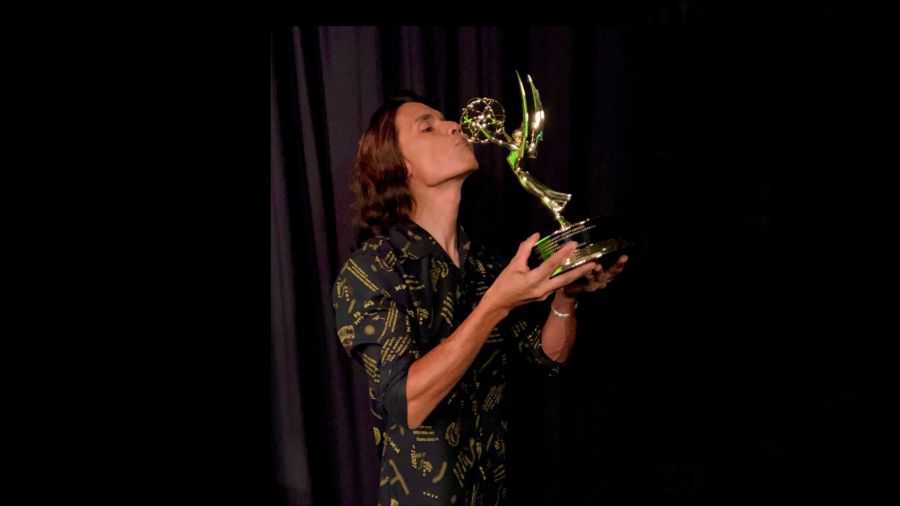PUNA, Hawaii (KHON2) — When Keoni Kealoha Alvarez began making films at 18, he never imagined he would one day be standing among the nation’s best, holding an Emmy.
Alvarez, a Native Hawaiian filmmaker from Hawaiʻi Island, recently earned a national Emmy for his work on a powerful documentary about the 2023 Maui wildfires titled Maui’s Deadly Firestorm.
The film, produced with Frontline PBS and CNN, documented the devastating Lahaina fire — now the deadliest U.S. wildfire in over a century — and brought national attention to a tragedy still unfolding.
“I’ve been doing this for over 25 years … when you have this kind of recognition … you have so much different stories, so many different talented people out in the world,” said Alvarez. “And just to be even recognized for is a dream come true.”
A story built on trust
Alvarez’s path to the Emmy began long before the flames swept through Lāhainā. For more than two decades, he has been documenting and protecting Hawaiian stories, especially those deeply rooted in culture, ʻohana and ʻāina.
His earlier work on a documentary about sacred Hawaiian burials helped lay the foundation. Kapu: Sacred Hawaiian Burials, which took 25 years to complete, built the kind of community trust most filmmakers can only hope to earn.
Kapu was screened at the Hawaiʻi International Film Festival and later picked up by PBS for international viewing.
“When they see the film, they knew that I had integrity to make sure I capture the stories and do it right,” Alvarez said.
That integrity is what brought Frontline PBS to his door after the wildfire. The director, aware of how sensitive the topic would be, reached out to Alvarez for help with connecting families in Lāhainaā.
“I did some phone calls. I asked around,” he explained. “I called the people I knew, and then they referred me to other families or relatives who was impacted by the wildfire.”
Preserving stories with dignity
The wildfire left more than 100 people dead and displaced countless families. For Alvarez, documenting that kind of pain came with responsibility.
“You had every single news [outlet] that was down within the small community,” he said. “But we actually had to spend time with some of the families… just kept them comfortable with who we are and what we were there to do.”
That trust allowed people to open their homes and hearts to the film crew. Many had never shared their stories publicly before. And some still cannot watch the finished documentary, too overwhelmed by the trauma.
“It’s going to take many years,” Alvarez said. “This is something that impacted them for the rest of their lives, especially for the families who have been there. Generational families.”
The weight of recognition
Alvarez’s work not only amplified voices from Lāhainā but demanded accountability from institutions. The film includes interviews with residents, cultural experts and government officials, each one fact-checked by Frontline’s rigorous standards.
“Every single sentence within the film has to be fact-checked,” Alvarez said. “So nobody had any question about it.”
Winning an Emmy wasn’t the goal, but it affirmed the importance of the story. For Alvarez, the award represents more than professional success. It’s a recognition of the lives affected, the culture preserved and the years of effort behind the scenes.
“I really appreciate that the academy recognized the story,” he said. “This is just not one award. The Academy watched it… and the voices, the stories in that film were heard.”
Continuing the journey
Despite the honor, Alvarez remains grounded. He sees himself as a student first, a learner of culture, filmmaking and community storytelling.
“I always plan for the hardest road,” he said. “I humble myself to know that I’m just a student. I’m just here to share our stories, our experiences.”
He’s not done. His next goal? An Oscar. But as always, Alvarez isn’t chasing trophies; he’s chasing truth, connection and cultural preservation.
“If it can help another person in a meaningful way, then I’ve done my job,” he said. “And if I can achieve that, then I reach my goal.”
You can click here to watch Alvarez’s Emmy Award winning documentary. You can also click here to watch Kapu, a film that has stirred much buzz in the Indigenous filmmaking world.










